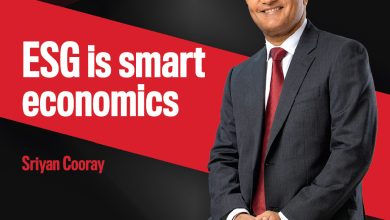BUSINESS INNOVATION
The right to play
Ranil Vitarana

In a rapidly evolving business environment, innovation isn’t simply a product; it’s a culture, asserts Ranil Vitarana. He believes an innovative business is one that continues to reinvent itself, staying ahead of the curve and setting industry benchmarks.
“An innovative organisation creates solutions that consistently win in the market, helping brands differentiate themselves. When you help your customers succeed in the market, they rarely seek discounts or apply pricing pressure,” he opines.
According to Vitarana, customers who work with innovative companies prefer strategic relationships over transactional businesses, thereby enabling these companies to command high quality business.
CONSUMER TRUST The ability to connect with consumers and create a truly consumer centric solution that resonates with them builds a strong reputation for innovation. And Vitarana notes that this in turn builds consumer trust and loyalty.
Citing Apple as an example, he says: “Apple is known for innovation, and despite high prices and rare discounts, consumers continue to purchase its products. Consumers trust the value of their purchases and flock to purchase new products upon their release, even when differences between generations are minimal.”
MARKET LEADERSHIP Vitarana goes on to say that if you aren’t an Apple or a Tesla – with the capability to create a need and an association – and are a B2B vendor instead, it’s crucial to understand consumer trends and behaviours.
Ensuring that solutions constantly evolve with consumer needs is essential for maintaining leadership in this field, he adds.
Innovative companies adopt a strategic and targeted approach to market growth, introducing products and solutions that set them apart from competitors. Vitarana cites a two-pronged strategy in this regard: firstly, defending its existing market share and constantly bringing newness to this customer segment.
The second element is identifying specific opportunities that offer a ‘right to play’ where current capabilities can be applied. By creating targeted solutions, one can easily acquire new segments, and thus drive market share and revenue growth.
ENCOURAGING INNOVATION “Culture is not merely a function of resources. Companies that have the highest innovation budgets aren’t necessarily the most successful. It is essential to have a dedicated innovation team focussed on the long-term needs of consumers and markets, and are divorced from day-to-day operational pressures,” Vitarana observes.
But he maintains that this team must be aligned with the core business and firmly anchored by deliverables linked to performance. He emphasises that innovation is not purely a technical function; it’s predominantly a business function.
Accordingly, the innovation team should include business, finance, project management, and technical and scientific capabilities, to drive results and accountability.
GUIDING LEADERSHIP Creating an innovative culture is a top-down process, Vitarana believes: “Leadership must lead by example and understand the difference between a pivot versus a kill versus a failure, and treat each accordingly. Innovation is a hypothesis led process where you continuously validate hypotheses through
a stage gate process.”
What’s more, he notes that as organisations move up the ladder, this minimises the chances of failure – and improves its chances of success. However, he stresses that innovation leaders must be evidence led sans egos and capable of risk aware decision making.
MEASURING SUCCESS Vitarana is of the opinion that an organisation’s business needs to be tiered.
He explains: “Generally, this includes mass-market products, which may be price and operational efficiency sensitive, or premium products that require newness and creativity. Each case has different innovation needs, and it’s important as a business to understand how these needs contribute to improved margins, customer adoption and other unique metrics.”
“The innovation team needs to innovate vis-à-vis each opportunity. For example, in the mass market, innovation could be the only way to increase profitability by driving operational or manufacturing efficiencies,” he sums up.





